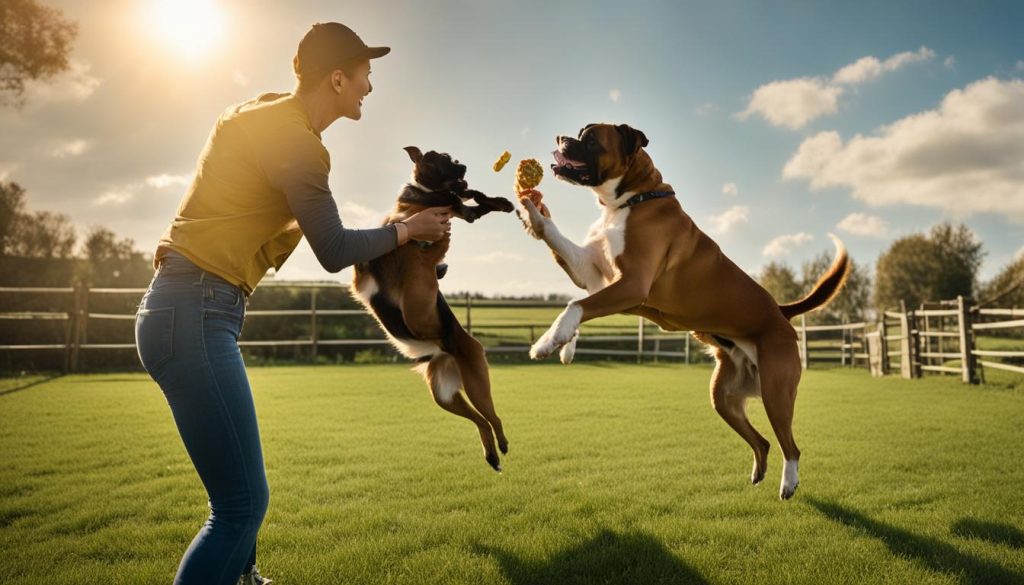When it comes to describing the personality of a Boxer, there are a few key traits that set this breed apart. Boxers are known for their distinctive appearance, with their stocky, muscular build and signature brachycephalic (squashed) face. These dogs have a medium to large size, with males weighing between 65-80 lbs and standing around 22 inches at the withers. Boxers come in various colors, including fawn, brindle, and white flashing with a black mask.
But it’s not just their looks that make Boxers stand out. They are highly energetic dogs that require at least 40 minutes of exercise per day to keep them happy and healthy. Boxers have a lifespan of 8-10 years and are recognized as a common breed by the American Kennel Club (AKC).
Key Takeaways:
- Boxers have a distinctive appearance, with a stocky build and a squashed face.
- They require at least 40 minutes of exercise per day to meet their energy needs.
- Boxers have a lifespan of 8-10 years and are recognized by the AKC.
Now that we’ve covered the basic facts about the Boxer breed, let’s dive deeper into their temperament and behavior, which play a significant role in understanding their personality.
About the Boxer

The Boxer dog is beloved for its unique disposition, temperament, and behavior. These dogs are known for their intelligence, high energy levels, and playful nature. Boxers are fiercely loyal and dedicated to their owners, forming strong bonds with their families.
Boxers have a strong guarding instinct, making them excellent protectors of their home and loved ones. While they are not excessive barkers, they may communicate their thoughts with a growling noise. They have a friendly and outgoing personality and thrive on social interaction, particularly with their human companions.
One important aspect of a Boxer’s temperament is their high need for exercise and mental stimulation. Without proper outlets for their energy, they can become destructive when left alone. Boxers thrive in active households and can adapt well to various living situations, as long as they receive regular opportunities for exercise and mental engagement.
Boxer Temperament Traits
- Intelligence: Boxers are highly intelligent dogs, making them relatively easy to train.
- Social Nature: These dogs are highly social and thrive on human companionship.
- Protectiveness: Boxers have a protective instinct towards their loved ones and can serve as excellent watchdogs.
- Good with Children: Boxers are typically great with children if properly socialized from an early age.
It is important to note that Boxers require a structured environment and consistent training to shape their behavior. With the right care, training, and socialization, Boxers can make wonderful additions to any family and bring endless joy and companionship.
Boxer History

The Boxer breed has a fascinating history that can be traced back to 19th century Germany. It is believed that Boxers are descendants of extinct bullenbaiser breeds crossed with mastiffs, bulldogs, and possibly Great Danes and terriers. Initially, Boxers were used as bull-baiting dogs, showcasing their courage and strength. Later, they found utility in slaughterhouses, where their strong jaws and agility made them valuable helpers. The Boxer breed derived its name from the German word “boxl,” which referred to their role in these slaughterhouses.
However, the significant development and recognition of Boxers as a distinct breed came in the early 20th century. Breeders focused on refining the qualities of the Boxer, emphasizing traits like intelligence, loyalty, and a friendly disposition. This selective breeding resulted in the modern Boxer breed that we know today. While Boxers were not imported to the United States until after World War I, they quickly gained popularity and became one of the most beloved breeds in America by the 1940s.
Today, Boxers are recognized as working dogs and have served in various roles such as police dogs, search and rescue dogs, and even as seeing-eye dogs for the visually impaired. Their versatility, intelligence, and loyalty have made them highly regarded pets and companions in households around the world. The Boxer breed’s rich history adds to its charm and allure, further enhancing its appeal to dog lovers everywhere.
The Development of Boxers
The development of Boxers involved careful selective breeding to refine their characteristics and temperament. Breeders sought to create a dog that was not only powerful and agile but also had a friendly and docile nature. Through the crossing of different breeds, including mastiffs, bulldogs, and terriers, breeders achieved their goal of creating a breed that possessed the ideal combination of strength, intelligence, and loyalty.
One of the significant factors that contributed to the development of Boxers was their role as working dogs in slaughterhouses. The demands of this environment required dogs that were highly trainable, versatile, and capable of performing various tasks. Boxers excelled in these roles, showcasing their intelligence and adaptive nature.
As the breed gained recognition and popularity, breeders focused on refining and standardizing the breed’s physical characteristics, such as their distinct facial features, strong build, and sleek coat. Today, the modern Boxer breed is the result of centuries of careful breeding, ensuring they possess the ideal balance of physical strength, agility, and a friendly temperament.
Boxer Timeline
| Year | Event |
|---|---|
| 19th century | Boxers are believed to have originated in Germany from a mix of bullenbaiser breeds, mastiffs, bulldogs, and terriers. |
| Early 20th century | Boxers were selectively bred to refine their characteristics and temperament, resulting in the modern Boxer breed we know today. |
| After World War I | Boxers were imported to the United States and quickly gained popularity, becoming one of the most beloved breeds in America. |
| Present day | Boxers are recognized as working dogs and have served in various roles, including police dogs, search and rescue dogs, and seeing-eye dogs. |
Boxer Temperament and Behavior

When it comes to understanding the behavior and personality traits of Boxers, it’s important to recognize their friendly and outgoing nature. Boxers are known for their affectionate and playful temperament, making them a beloved choice for families.
One of the key characteristics of Boxers is their intelligence, which makes them relatively easy to train. They respond well to positive reinforcement methods and enjoy learning new commands and tricks. However, it’s essential to provide consistent training and socialization from an early age to shape their behavior and ensure they grow up to be well-adjusted dogs.
Boxers are highly social animals and thrive in the company of their families. They form strong bonds with their owners and are usually great with children and other pets if properly socialized. However, they can be wary of strangers and may exhibit protective behavior, which makes them excellent watchdogs.
| Traits | Description |
|---|---|
| Playfulness | Boxers have a playful nature and love interactive games with their families. |
| Loyalty | They are dedicated and loyal to their owners, forming strong bonds with their families. |
| Protectiveness | Boxers have a natural instinct to protect their loved ones and their homes. |
| Intelligence | They are intelligent dogs that respond well to positive reinforcement training methods. |
| Energy | Boxers have high energy levels and require regular exercise and mental stimulation. |
Boxers are known for their friendly, outgoing, and playful temperament. They are intelligent dogs that are generally easy to train, responding well to positive reinforcement methods. Boxers are highly social animals and thrive in the company of their families. They are usually great with children and other pets if properly socialized from an early age. However, they can be wary of strangers and may exhibit protective behavior.
It’s important to provide a structured environment and consistent training to help shape their behavior. Boxers require regular physical activities and interactive playtime to prevent boredom and destructive behaviors. Engaging them in obedience training, agility exercises, and interactive toys can help keep their minds active and prevent behavioral issues.
To summarize, Boxers are known for their friendly and playful temperament. They are highly intelligent, loyal, and protective of their families. With proper training, socialization, and an active lifestyle, Boxers make excellent companions for families who can provide the love and care they need.
Boxer Care and Grooming
Proper care and grooming are important aspects of keeping your boxer healthy and looking their best. While boxers are relatively low-maintenance when it comes to grooming, there are still some essential practices to keep in mind.
Grooming Needs
Boxers have short, smooth coats that require regular brushing to control shedding. A weekly brushing session with a soft-bristle brush or grooming mitt will help remove loose hairs and keep their coat looking shiny. Additionally, regular nail trims are necessary to prevent overgrowth and discomfort. It’s also important to clean their ears regularly to prevent infections and keep them free of debris.
Coat Care
Boxers are a moderate drooling breed, and some may snort and snore. Regular dental care, including daily teeth brushing, is essential to maintain their oral health and prevent dental issues. Additionally, boxers are intolerant of hot weather, so it’s important to provide them with shade and plenty of fresh water to prevent overheating. Similarly, due to their short coats, they need protection from the cold, so make sure they have a warm shelter or clothing during chilly weather.
| Grooming Needs | Frequency |
|---|---|
| Brushing | Weekly |
| Nail Trimming | Every 4-6 weeks |
| Ear Cleaning | Weekly |
| Dental Care | Daily |
Boxer Health and Longevity

As with any breed, Boxers are prone to certain health issues that potential owners should be aware of. It is important to understand these health concerns to ensure the well-being and longevity of your Boxer.
Common Health Issues
Boxers are susceptible to various health conditions, including:
- Hip dysplasia: a common joint disorder
- Elbow dysplasia: another joint disorder that affects the elbows
- Cancer: Boxers have a higher risk of developing certain types of cancer
- Heart disease: including arrhythmogenic right ventricular cardiomyopathy (ARVC)
It is important to note that not all Boxers will develop these conditions, but they are more prone to them compared to other breeds. Regular check-ups with a veterinarian can help monitor and manage these health issues.
Boxer Lifespan
The average lifespan of a Boxer is typically around 8 to 10 years. While this may be shorter compared to some other breeds, it is important to note that individual Boxers can live longer with proper care, nutrition, and regular veterinary check-ups. Boxers thrive in a loving and attentive environment and can provide years of joy and companionship to their owners.
| Health Issue | Prevalence | Prevention |
|---|---|---|
| Hip dysplasia | Common | Regular exercise, maintaining a healthy weight |
| Elbow dysplasia | Common | Regular exercise, maintaining a healthy weight |
| Cancer | Higher risk | Regular veterinary check-ups, early detection |
| Heart disease | Higher risk | Regular veterinary check-ups, genetic testing |
“While Boxers may be prone to certain health issues, with proper care and attention, they can live happy and fulfilling lives.”
Boxer as a Family Pet
Boxers are highly regarded as excellent family pets due to their affectionate and loyal nature. These dogs form strong bonds with their human companions and are known for their gentle and patient behavior, making them great with children. Boxers are highly social animals and thrive on human interaction and companionship, making them a perfect fit for families looking for a loving and devoted furry friend.
With their protective instincts, boxers also make excellent watchdogs, ensuring the safety of their loved ones. Their friendly and playful demeanor, combined with their loyalty and dedication, make them an ideal choice for families of all sizes and ages. Whether you have young children, other pets, or even elderly family members, boxers are known to adapt well and provide endless joy and companionship.
To ensure a well-behaved and well-adjusted boxer, early socialization and training are crucial. By exposing them to various people, animals, and environments, boxers can develop good manners and confidence. Regular exercise and mental stimulation are also essential to meet their energy levels and prevent boredom or destructive behaviors. With the right care, attention, and love, boxers can truly thrive as valued members of any family.
| Boxer as a Family Pet | Benefits |
|---|---|
| Loving and affectionate | Boxers form strong bonds with their human families and are known for their loving and affectionate nature. |
| Good with children | Boxers are patient and gentle with children, making them great companions for families with young kids. |
| Adaptable to different households | Boxers can adapt well to different living situations, whether it be a country estate or a city apartment, as long as they receive regular exercise and mental stimulation. |
| Protective instincts | Boxers have a natural protective instinct towards their loved ones and can serve as excellent watchdogs. |
| Social and friendly | Boxers thrive on human interaction and companionship, making them a great fit for families seeking a social and friendly pet. |
Boxer Training and Socialization

Proper training and socialization are vital for ensuring a well-behaved and well-adjusted Boxer. These intelligent and eager-to-please dogs respond well to positive reinforcement methods, such as treats, praise, and playtime. Setting clear boundaries and consistently reinforcing desired behaviors will help shape their training journey. Remember, patience and consistency are key when training a Boxer.
Early socialization is crucial for Boxers to develop good manners and confidence. Introduce them to various people, animals, and environments from a young age to ensure they become well-rounded and sociable. Positive experiences during socialization will help prevent fearfulness or aggression in adulthood. Encourage friendly interactions and reward calm behavior.
Training Tips:
- Start training early: Begin training your Boxer as soon as you bring them home. The earlier you start, the easier it will be to establish good habits and prevent undesirable behaviors.
- Use positive reinforcement: Reward your Boxer with treats, praise, and playtime when they exhibit desired behaviors. Avoid harsh punishment or scolding, as it can undermine their trust and willingness to learn.
- Be consistent: Set consistent rules and expectations for your Boxer. This will help them understand what is expected of them and reduce confusion.
- Keep training sessions short and engaging: Boxers have a short attention span, so keep training sessions brief and engaging. Break the training into small, manageable tasks and end each session on a positive note.
- Enroll in obedience classes: Consider enrolling your Boxer in obedience classes led by a professional trainer. These classes provide structured learning opportunities and help reinforce training commands in a controlled environment.
Remember, every dog is an individual, and training methods may vary. Tailor your training approach to your Boxer’s personality and learning style. If you encounter any challenges, don’t hesitate to consult with a professional dog trainer for guidance and support.
Wrapping Up
After exploring the various aspects of the Boxer breed, it is clear that they make exceptional family pets. With their lively and intelligent nature, Boxers bring endless joy and companionship to their human families. Their friendly and playful demeanor, coupled with their unwavering loyalty, makes them a beloved choice for many households.
However, it is important to understand the specific needs of Boxers to ensure their happiness and well-being. Their high energy levels necessitate regular exercise and mental stimulation. Active households that can provide the physical and mental activity required by Boxers are ideal for this breed.
Boxers thrive when they receive proper training and socialization from an early age. Early exposure to various people, animals, and environments helps shape their behavior and instill good manners. With consistency, patience, and positive reinforcement, Boxers can easily grasp obedience commands and become well-adjusted members of the family.
To summarize, Boxers are the perfect combination of an affectionate family pet and a loyal companion. By meeting their exercise needs, providing proper training, and offering a loving environment, Boxers can bring immense happiness and fulfillment to their human families. Their friendly and playful nature, coupled with their unwavering loyalty, truly makes Boxers a cherished addition to any home.
FAQ
What are the physical characteristics of a Boxer?
Boxers are stocky, muscular, and powerful dogs with a brachycephalic (squashed face), droopy eyes, and floppy ears. They have a medium to large size, with males weighing between 65-80 lbs and standing at about 22 inches at the withers. Boxer coats come in fawn, brindle, with or without white flashing and a black mask.
How much exercise does a Boxer need?
Boxers are highly energetic and require more than 40 minutes of exercise per day. They thrive in active households and need regular opportunities for exercise and mental stimulation.
What is the lifespan of a Boxer?
Boxers typically have a lifespan of 8-10 years.
Are Boxers good with children and other pets?
With proper socialization, Boxers are generally good with children and other pets.
How much grooming does a Boxer require?
Boxers have short, smooth coats that require weekly brushing to control shedding. They are moderate droolers and may require regular dental care.
What are the common health concerns in Boxers?
Some common health concerns in Boxers include hip dysplasia, elbow dysplasia, cancer, heart disease, and arrhythmogenic right ventricular cardiomyopathy (ARVC).
Are Boxers good family pets?
Yes, Boxers make excellent family pets. They are affectionate, loyal, and protective of their loved ones.
Are Boxers easy to train?
Yes, Boxers are intelligent and eager to please, making them relatively easy to train. Positive reinforcement methods work best with them.
How do I properly care for a Boxer?
Proper care for a Boxer includes providing regular exercise, mental stimulation, grooming, and veterinary check-ups.






